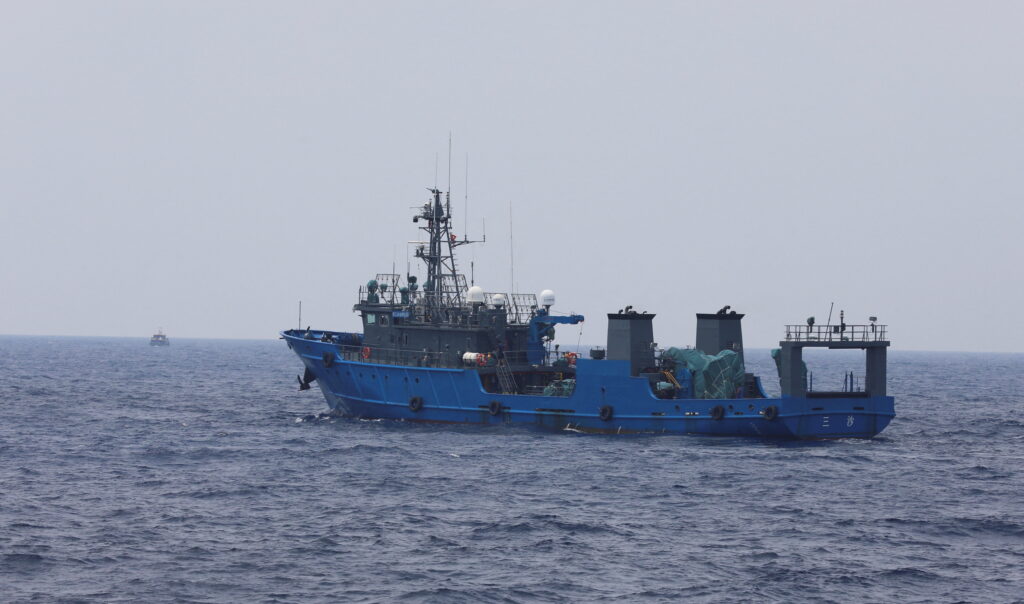Philippine President Ferdinand R Marcos Jr’s outreach to Vietnam for maritime cooperation comes against a backdrop of China’s assertiveness in the South China Sea (SCS) and regional countries’ consequent efforts to counter it.
During President Marcos Jr’s visit to Vietnam in January 2024, both countries signed Memorandums of Understanding on ‘preventing untoward incidents in the South China Sea’ and cooperation between the two countries’ coast guards, establishing a direct hotline between them.
ASEAN, at the forefront of managing Southeast Asian countries’ issues, has found itself lacking. Despite featuring talks on the SCS in every agenda, the lack of concrete results is pushing regional claimant states to bypass ASEAN-led negotiation on the dispute. The Philippines’ outreach to Vietnam is a manifestation of this trend.
The Philippines has been forging strategic partnerships within the US alliance network, including Japan and Australia, to build deterrence against Chinese coercion. This outreach to Vietnam could help resolve lingering issues between the claimant states, potentially resulting in the successful negotiation of the Code of Conduct within ASEAN.
The negotiation process on the Code of Conduct in ASEAN has fatigued the Philippines — along with several others — and is marred by increasing Chinese aggression. In this light, the Philippines’ proposal to Vietnam and Malaysia to formulate their own Code of Conduct is unsurprising. Marcos is signalling ASEAN to expedite the Code of Conduct process — otherwise, the Philippines is eager to take the negotiations bilaterally or multilaterally with the claimant states.
Analysts are quick to conclude that regional claimant countries are coming up against China. Yet, these efforts to balance China in the SCS have their limitations.
Negotiating the Code of Conduct is difficult due to many issues, including several contentious provisions on geographical scope, joint military exercises with extra-regional countries and joint exploration of oil and gas with companies from outside the region.
Regional claimant countries do not share a similar approach to countering China. Manila has become more proactive in countering China by adopting a collective deterrence strategy, bolstering ties with like-minded countries, particularly the United States and its allies. Under the Marcos Jr administration, the Philippines has publicised China’s provocative actions in the SCS.
On the other hand, Hanoi has been prudent in dealing with China on the SCS issue. Unlike the Philippines, Vietnam prefers to deal with Beijing’s provocative actions privately, allowing it to manage and isolate maritime issues from wider bilateral relations with China. As demonstrated by Khang Vu, Vietnam has consistently assured China that it will not ally against any third power unless Beijing threatens Vietnam’s territorial integrity. This assurance allows China to detach the SCS dispute with Vietnam from the wider US–China rivalry.
This divergence can be observed from the media’s commentary on the visit. Unlike the Philippines’ media, which portrayed the agreement as a response to Chinese assertiveness, the state-run Vietnamese media covered it as a bilateral agreement on maritime cooperation. Malaysia, also a claimant state in the SCS, has scaled back its earlier tougher stance in negotiations, intending not to counter China.
Domestic politics in Southeast Asian countries acts as a substantial hindrance to presenting a bulwark against Chinese aggression. The Communist Party of Vietnam’s (CPV) inter-party ties with the Chinese Communist Party (CCP) are meant to consolidate the CPV’s domestic political authority, as the CCP supports the CPV’s economic reforms and socialist cause against domestic political opponents. Vietnam is unlikely to adopt any considerable balancing approach against China because such an approach may jeopardise the CPV’s political standing at home.
Anti-China nationalism exists in Vietnam, but the CPV has been successful in managing it or quelling the anti-China protests when needed, signifying its indelible ties with the Chinese Communist Party.
In contrast, the Philippines has a history of flip-flopping its China strategy based on the party in power. Ascendancy by the pro-China lobby in Manila could alter the current approach against China. The growing rift in the ruling Marcos–Duterte alliance could engender such a shift, as recent polls have predicted that Sara Duterte — daughter of former president Rodrigo Duterte — is a strong contender to succeed President Marcos Jr.
Marcos has also faced domestic resistance regarding granting the United States access to four additional military bases under the Enhanced Defence Cooperation Agreement. His sister, Imee Marcos — the governor of Cagayan province, where three of the four bases are located — have been particularly vocal opponents.
China’s wedge strategy has prevented regional countries from mounting considerable balancing efforts against it. Beijing has used its ‘Three Warfares’ strategy — public opinion, psychological and legal warfare and economic rewards — to keep Southeast Asian countries divided on the SCS dispute. Democracy deficit and weak internal cohesion, which have characterised Southeast Asian countries for decades, further amplify external powers’ wedge-driving capacity. China’s wedge strategy has been successful in paralysing ASEAN — the leading agency in managing Southeast Asian regional affairs — by abusing its institutional mechanism process.
Regional claimant states — fatigued by ASEAN’s inability to resolve the dispute and facing the brunt of Chinese aggression — may increasingly forge ties among themselves. But such efforts are unlikely to compel China to halt its aggressive campaign in the SCS.
Harshit Prajapati is PhD Scholar at the Centre for Indo-Pacific studies, Jawaharlal Nehru University New Delhi.
Prisie L. Patnayak is PhD Scholar at the Centre for Indo-Pacific studies, Jawaharlal Nehru University New Delhi.


Philippine President Ferdinand R Marcos Jr aimed to counter China's assertiveness in the South China Sea by developing maritime cooperation with Vietnam, cultivating strategic partnerships with Japan, Australia and the United States, and pushing for a successful negotiation of a Code of Conduct within ASEAN. But disparity in regional approaches to China, varying domestic policies of Southeast Asian nations, and China's effective wedge strategy pose significant hurdles to a united front against China's aggression in the region.